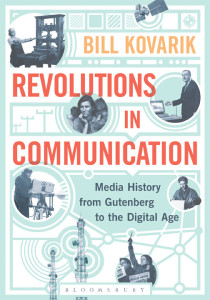SYLLABUS

Textbook: Revolutions in Communication, Media History from Gutenberg to the Digital Age, ISBN-13: 978-1628924787 or ISBN-10: 1628924780
By Bill Kovarik
About the course
The idea to create a journey for you and help you find areas you want to explore. History has ideas that can change your life and open your eyes to possibilities for the present and the future.
Some of the ideas you will encounter:
- History is more than a rear-view mirror. By seeing where we came from, we have a better idea about where we are going.
- People in the past confronted the same challenges you will confront. That’s why history can be inspiring, exciting and informative.
- The media may be the message, as McLuhan said, but in recent years, a more socially constructed view of the media has emerged. As Jimmy Wales of Wikipedia fame says, “We are the media.”
- Media monopolies (or near monopolies) are frustrating, and they give rise to a desire for new media technologies. When people are held back, they often spring forward.
- Every new medium creates its own revolution, and every revolution has its own best or favorite medium.
- Media change generally follows cycles of open innovation, closed consolidation, monopolistic control, and breakout new technologies.
- The global village has become a set of neighborhoods with bullhorns squawking through the night. But media can show us the world’s amazing diversity; It’s capable of far more than it has achieved so far.
- Global culture is a question of social construction, not simply one of technological momentum.

Structure of the course: This course surveys the history of four major media technologies within their own chronologies. For example, Printing (Chapters 1 to 3) takes us from 1455 to the 21st century. We start again in the 1400s with Imaging, but quickly move forward to photography (starting in 1839), along with cinema starting in the 1890s and advertising (starting in the 1800s), and all moving forward within their own chronology. Similarly, Electronic and Digital technologies both start in the early 1800s and move forward to the 21st century.
Goals: The primary goal of a class in the history of any subject is ( as Thucydides said 2,500 years ago) to provide a knowledge of the past as an aid to the interpretation of the future; to learn the lessons of history and to apply them to the present; to understand where we have been and so to consider where we might be going.
Students: You will be expected to:
- Read books and articles.
- Watch films about the media (documentary and fiction)
- Take chapter quizzes.
- Be able to respond to Discussion Questions on the web site.
- Select an historical research topic and work on a research memo / paper.
- Following Thucydides advice, can we use this history to help us interpret the future of the mass media? At some point you will deliver a futuristic prediction for your area of media based on historic trends.
Grading priorities: Attendance and/or assignments (10 %) Quizzes (20 %) Mid Term (20%) Final (20 %); Final project (30 %)
Other policies
• Attendance policy: (N/A for online classes, but work must be done on schedule).
• Late policy: Deadlines as posted need to be observed, or proportional reductions in grade will ensue.
• Honor Code: By accepting admission to Radford University, each students makes a commitment to understand, support and abide by the University Honor Code without compromise or exception.
• Plagiarism — Students who directly copy work from anyone else will flunk the class and be reported to the Dean of Students office.
Assessment:
To score an A in the class, you will have earned more than 1,000 points from the following categories:
- Online discussions – (twelve at 10 points each) = 120 points and one for 75 points.
- Films — (five at 25 points each) = 125 points
- Quizzes –(thirteen at 23 points each) = 300 points
- Mid Term — 140 points
- Final — 140 points
- Final project — 300 points
Total possible points: 1200.
- Extra credit: Attendance and participation at optional events to be announced.
About quizzes
There is a quiz for every chapter plus one for the introduction (named “Quiz 0”). So the chapter numbers should line up with the quiz numbers. For instance, the quiz for Ch. 5 is Quiz 5. This means there are actually 13 quizzes.
Important policies
- Late policy: Deadlines as posted need to be observed, or proportional reductions in grade will ensue.
- Honor Code: By accepting admission to Radford University, each students makes a commitment to understand, support and abide by the University Honor Code without compromise or exception.
- Plagiarism — Students who copy large amounts of work by others, without attribution, will fail the class and be reported to the Dean of Students office.
- Disabilities: If you are seeking academic accommodations under the Americans with Disabilities Act at Radford University, you are required to register with the Disability Resource Office (DRO). To receive academic accommodations for this class, please submit your documentation to the DRO in the lower level of Tyler Hall Suites 54-69, by fax to 540-831-6525, by email to dro@radford.edu. After submitting documentation to our office, you will set up an interview with a Disability Services Specialist to discuss accommodations. You will be notified via email once your accommodation package is complete and ready to be picked up. Once you have picked up your accommodation package, you will need to meet with each course professor during their office hours to review and discuss your package. For more information and/or for documentation guidelines, visit www.radford.edu/dro or call 540-831-6350.
